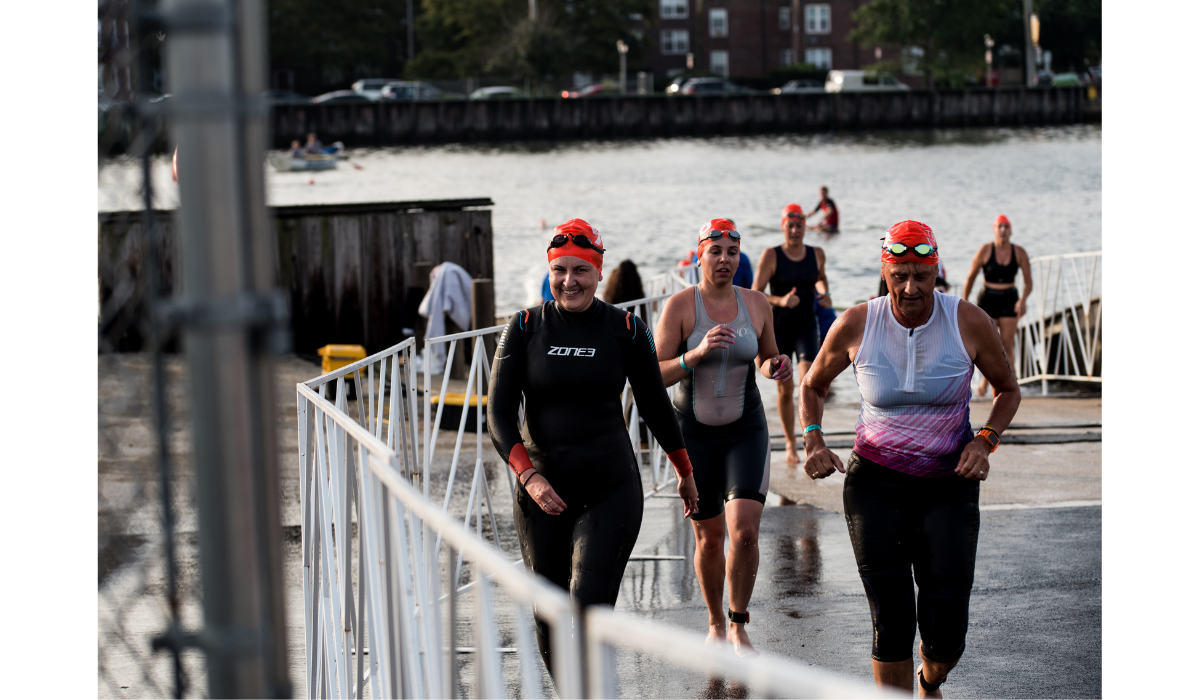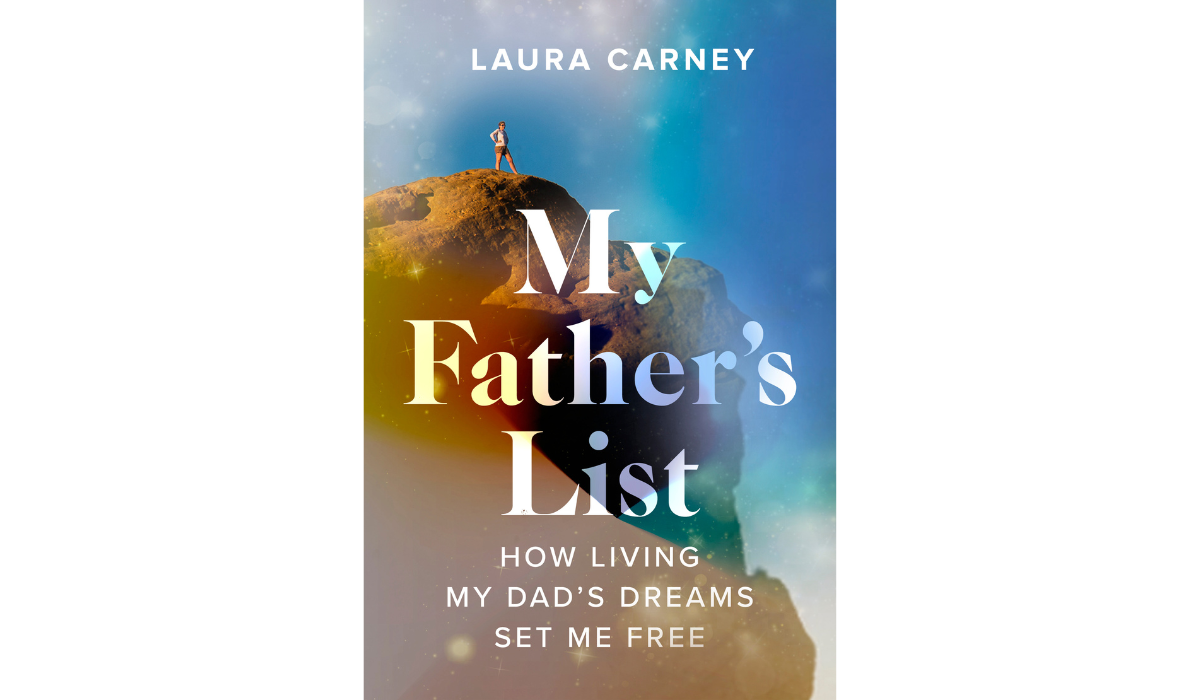Most of Us Think Middle Age Is a Time for Mastery. My Dad Taught Me It's A Time for Adventure
As I stood waiting for a Porta-potty, I heard the men talking behind me.
“I don’t know what that woman thought she was doing,” one said to his friend, “but there was no way she was getting by me! It’s like she wanted to drown.”
I was about to make my second attempt at completing a half Ironman and already I was surrounded by bros. I’d learned when I finished the New York Triathlon that this was common.
“You know, someone died in that river last year,” a white-haired man in a wetsuit said, shortly before I plunged into the water to start the race.
Training and competing in triathlons was part of my project to complete all 54 items from my late father’s bucket list. My dad died at age 54 because of a distracted driver. I was 25 when he died and 38 when I found his list—until then, I had no idea he’d left behind undone dreams.
My brother was moving into his first house when he found it—he’d unknowingly had it all that time. Dave showed me when my husband and I visited, wondering if I’d known about the bucket list, and I hadn’t. Only our mom did—my dad wrote the list at age 29, soon after I was born. But my parents divorced six years later.
My mom didn’t know my father kept checking off items.
By the time I was competing in my second half Ironman, I’d completed 47 of those 54 items on his list. It had taken me nearly six years. I was now 44, a fact I couldn’t escape as I glanced down at my leg and saw the Sharpied number on it. (Ironman race directors write your age on your arms and calves, so you can be identified during the bib-less portions.)
As I stepped into the water, I realized I was tired. I’d put in my months of training, but I was also finishing my dad’s bucket list and writing my first book. Why had I thought I needed to do an Ironman again?
After 30 minutes of swimming in Atlantic City’s Back Bay, it dawned on me: I was alone, no swimmers around me. The choppy water, the result of a storm, had pulled me from the buoys—swimming back would mean the time I’d spent getting there was wasted. There was a slim chance of my finishing the race—I’d likely go over the swim’s time limit.
This list item was “own a $200 suit,” the cost of a triathlon wetsuit. For two years I’d trained for this race, so I could feel I’d truly “owned” it. The suit looked like Captain Marvel’s online. In person, it was more like a Nivea bottle.
Triathlon training is involved, and as I’d prepared to compete in three sports—which required 10 to 16 hours of training per week—I found time to get to know myself. I wasn’t sure how I would feel once my dad’s list was finished. I wasn’t sure how I’d feel when my book was done, either. But training my way opened me up to other possibilities. If my book wasn’t published by one of the big publishers, I’d self-publish, I thought while cycling.
Reaching this half Ironman felt like a baby step to other life adventures. I just didn’t know I’d swim off-course.
When I reached where I should be, I wasn’t alone—there were lots of would-be swimmers. When you straggle, you’re surrounded by the guys who didn’t train. As I passed each one, I yelled.
“Keep going! We’re almost there! You got this!”
There’s a rhythm to swimming that I like. When I swim laps I count, and as I count, I sometimes sing, things like “Ain’t No Mountain High Enough,” or some other striving song. “Good Vibrations.” I sing any song that reminds me of my father, a man who couldn’t have imagined swimming 1.2 miles.
During the race that day, I kept touching what felt like jellyfish. I’d passed the eighth buoy, which meant there were only three left. It had now been an hour and a half.
I was middle-aged. This was not the time for this. It was the time for taking care of kids, for buying a new house, for rising in my career. I was supposed to be saving for the future, not spending what little I had on triathlon wetsuits.
Every item on my dad’s list that I sought to check off for him involved a moment like this, where I had to slay the dragon “thou shalt.”
In medieval fairy tales, dragons guarded gold and virgins, neither of which they had use for. Joseph Campbell theorized that in modern life, the dragon is in us. Your dragon is the part of you that says if you haven’t checked off the checkmarks being an adult requires, you’ve failed.
But you’ve only failed at the life your environment told you to have.
I’d swallowed enough water to bet I’d be sick later, yet I was determined. I would finish the swim.
Only two more buoys.
“Ain’t no mountain high, ain’t no valley low, ain’t no river wide enough, baby…”
When I sang the song in training, I thought it was about missing my dad—or of the day our spirits would reunite. Then I thought it was about finishing his list; that would be a good day, too. But now my goal felt closer to the song composer Nick Ashford’s intention.
He wasn’t writing about a love he hoped to reach.
“My love is alive, way down in my heart, although we are miles apart…”
Ashford was stuck as a songwriter. He could see his future in the back of his mind, where he’d be someday, how he’d feel, and knew he had to complete this song to get there.
A male triathlete who’d taken to backfloating suddenly yelled to me, “How are you beating me? You’re doing breaststroke!”
“If you ever need a helping hand, I’ll be there on the double, just as fast as I can…”
So many people had helped me check off the items on my father’s list. Joseph Campbell said people can help you slay the dragon. I’d learned a lot from my helpers. Mostly that we want the same things. Love. To be seen.
As I climbed out of the mucky bay, it was a matter of minutes to stay in this race. I stood on the concrete as the race director stared at his watch.
“I’m sorry,” he said. “You’re out.”
He bent down and pulled off my ankle tracker. A photographer crouched before me, but he didn’t have to ask me to smile.

I looked like a swamp creature. I’d grown a bay beard, my hair slipping out of my bathing cap, the skin around my eyes temporarily tattooed by my goggles. But I hadn’t given up.
When I saw my watch, I gasped. Instead of swimming 1.2 miles, I’d swum 2.5.
I’d just swum farther and faster than I knew I could.
According to the rules of this race, I couldn’t win. But according to the rules I’d made for me, it was my shining moment.
My dad had always told me I could do anything I set my mind to, that I was a “natural-born leader.” How this could be true of the shy girl who sat in the corner at school and drew, I wasn’t sure. He saw something in me I couldn’t see yet.
We are not here to become what we think we should be. We are here to be open to what’s possible.
After the swim, I collected my bike from the transition area and learned my friend Danielle hadn’t finished the race either. She’d dry-heaved on the bike course and gone to the ER. But the day after the race, she wrote this on Facebook: “Laura’s triathlon journey has been to own a $200 suit, and she ABSOLUTELY HAS…Laura and her husband, Steven, even waited with me and my parents while the Ironman staff wasted hours of my time promising to get my change of clothes from the finish line. Their kindness and dedication to others is unmatched, and I’ll never forget that. Someone commented on Laura’s post ‘DNF=dreams not finished.’ Laura already has her plan to build back up, and in everything she does, she builds connections and builds others up. If that’s not an Ironman, a superhero really, I don’t know what is.”
Owning a $200 suit had meant owning who I was: a person who doesn’t give up, even if she’s losing, and who waits with her friend afterward.
Hours after the race, I found a video online someone had made of dolphins spotted in the Back Bay that day. They’d entered the waters as the last swimmers (aka, me) finished. Dolphins symbolize freedom, but they also create community wherever they go. It’s rare to find them in a bay.
Many months later, I sat in front of the audience for the launch of my first book—my story of finishing my father’s list. I counted the smiling faces—all people I didn’t know when I started my project.
I’d been like a dolphin, the opposite of a dragon.
I tried not to cry when my triathlete friend Danielle asked me to sign her book.

A writer and magazine copy editor in New York, Laura Carney has been published by the Washington Post, the Associated Press, The Hill, Runner’s World, Good Housekeeping, and other places. She has worked as a copy editor in national magazines for twenty years, including Vanity Fair, GQ, People, and Good Housekeeping. Her first book, My Father’s List, was just published from Post Hill Press. To learn more, visit bylauracarney.com.
Please note that we may receive affiliate commissions from the sales of linked products.



